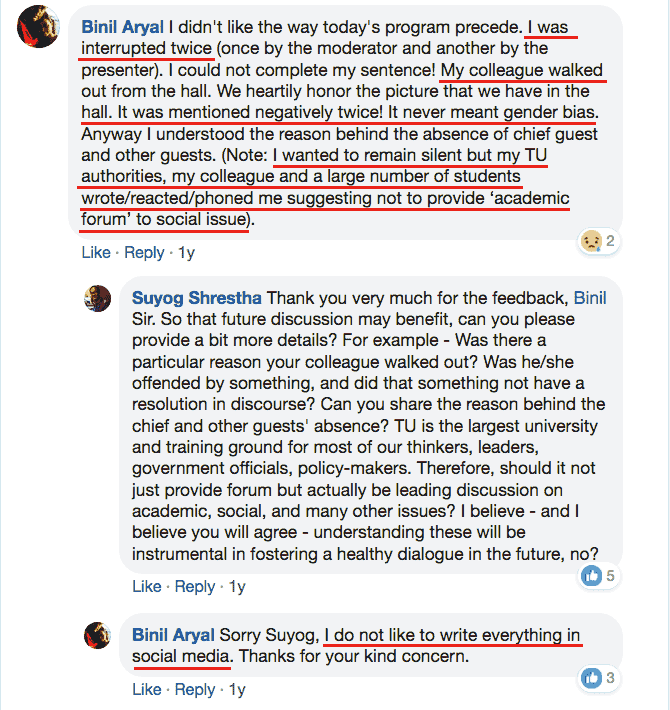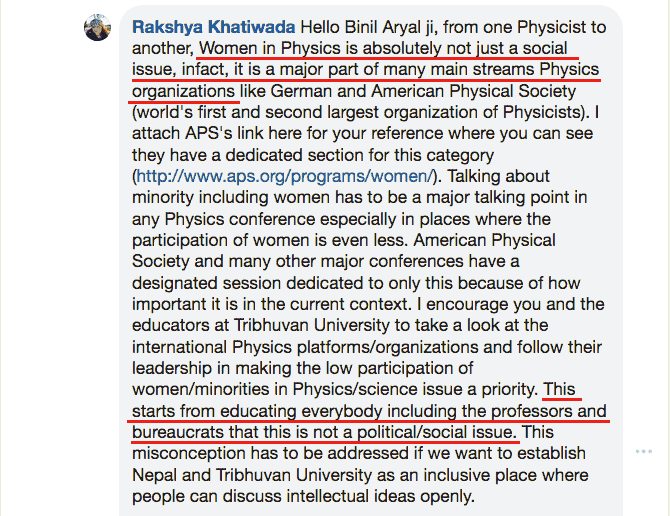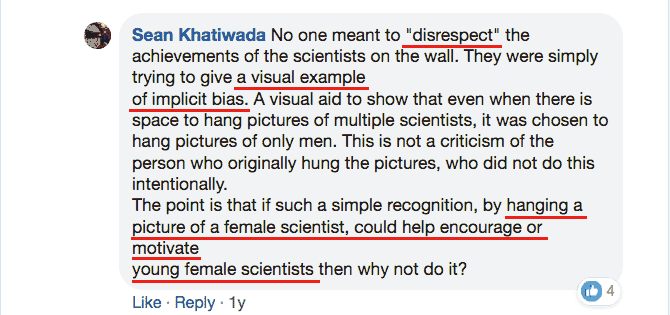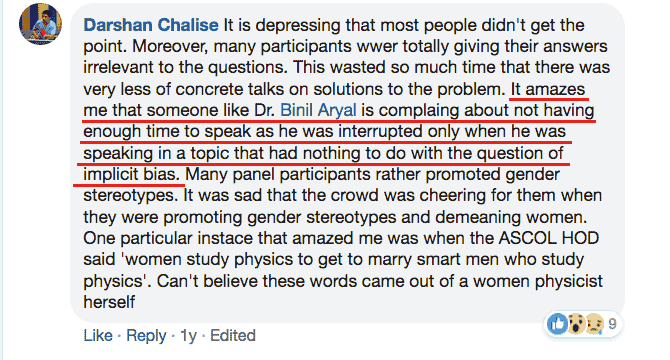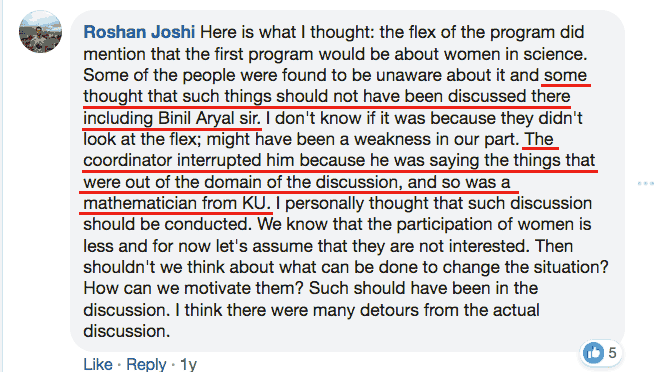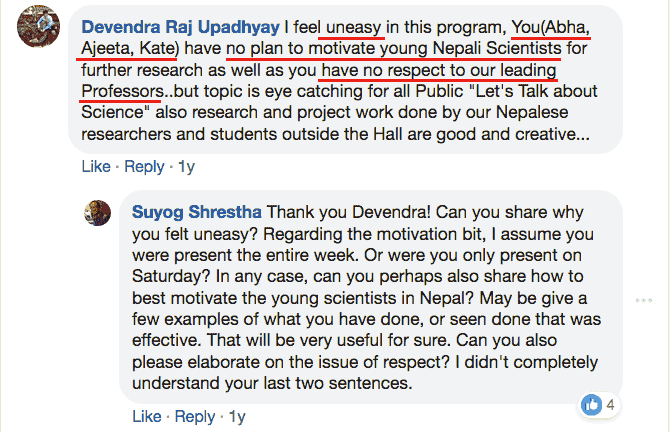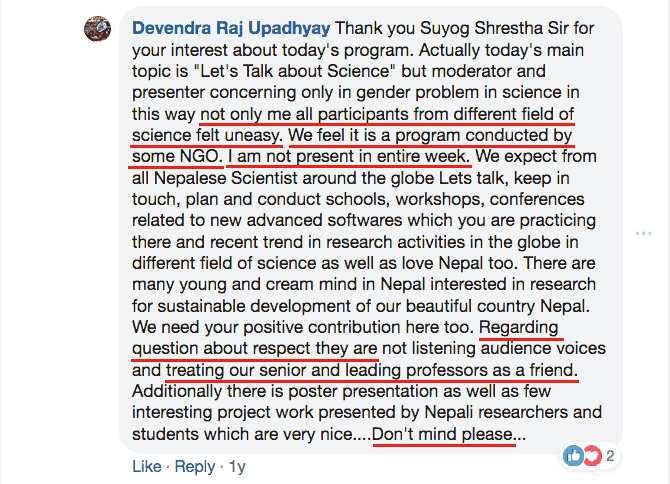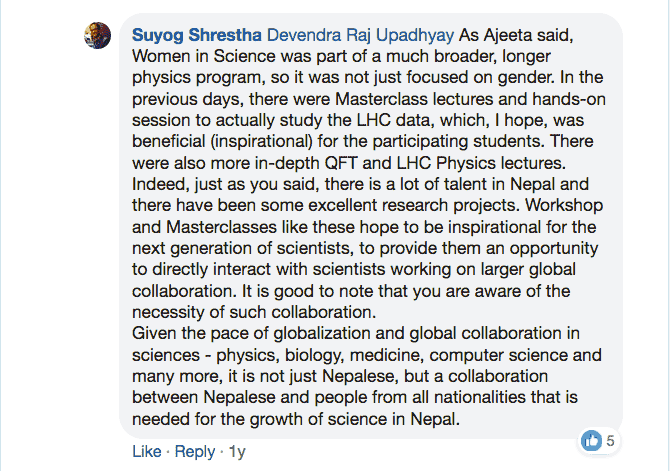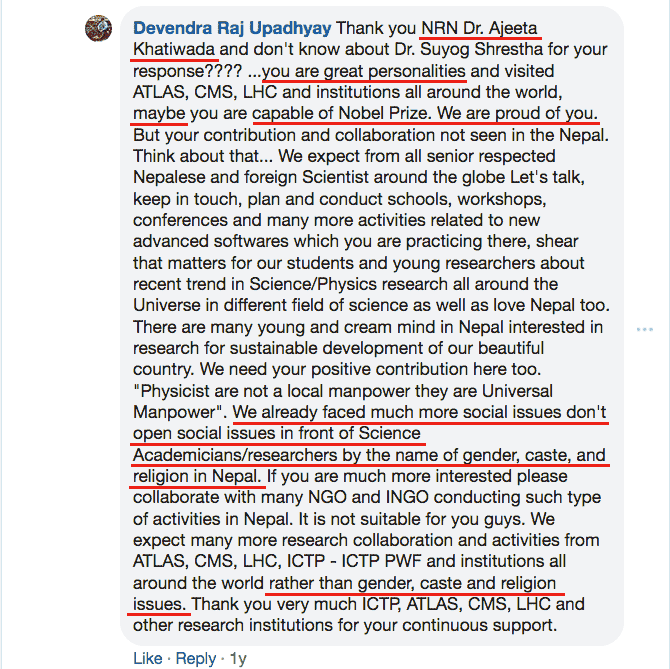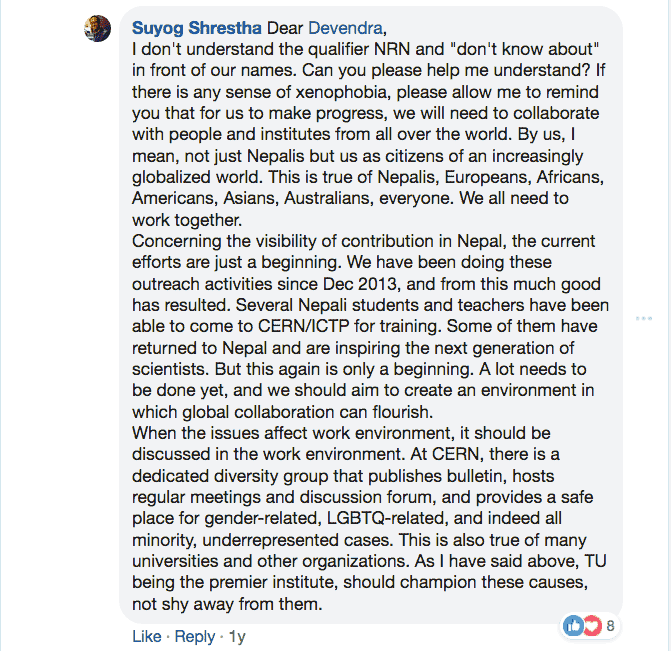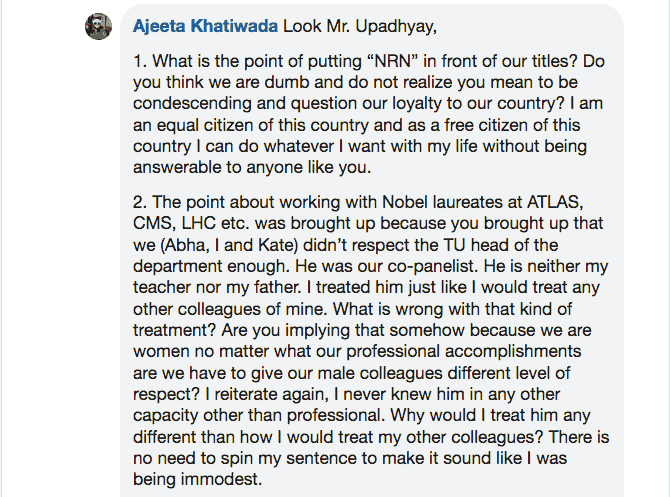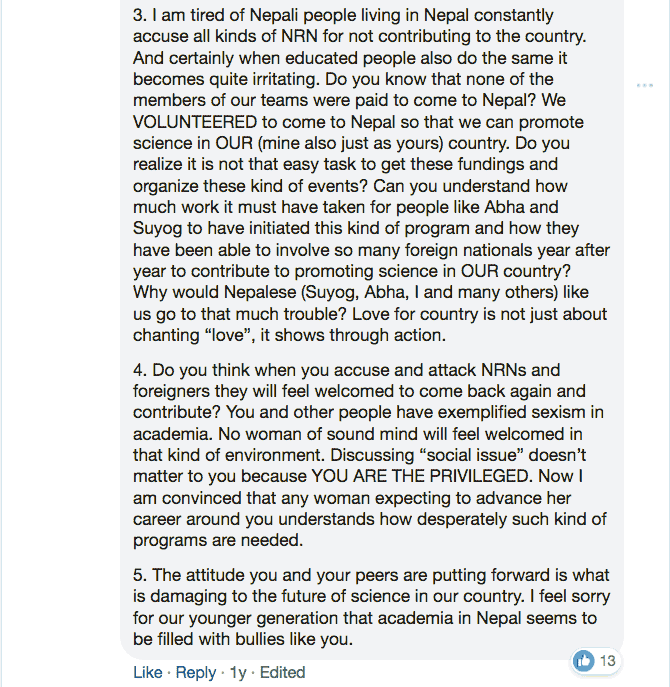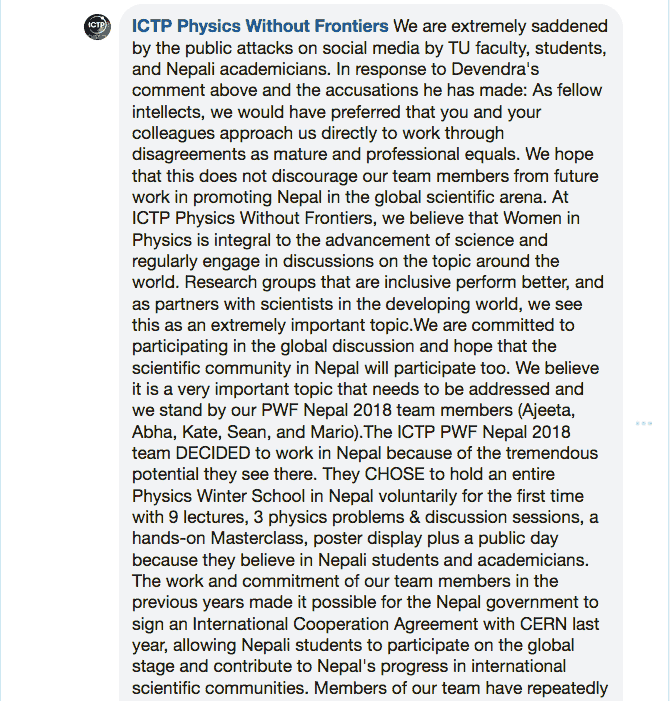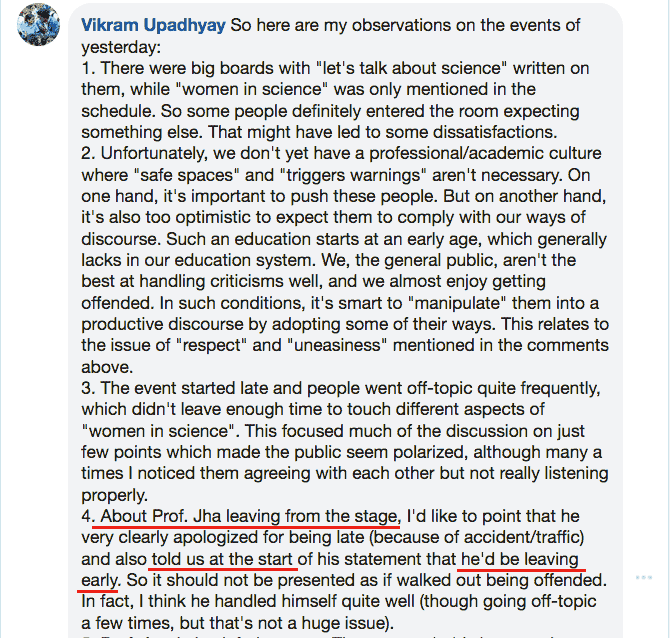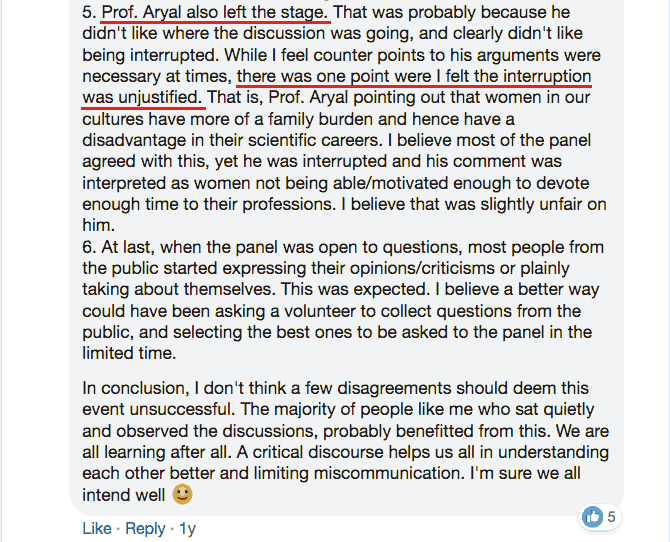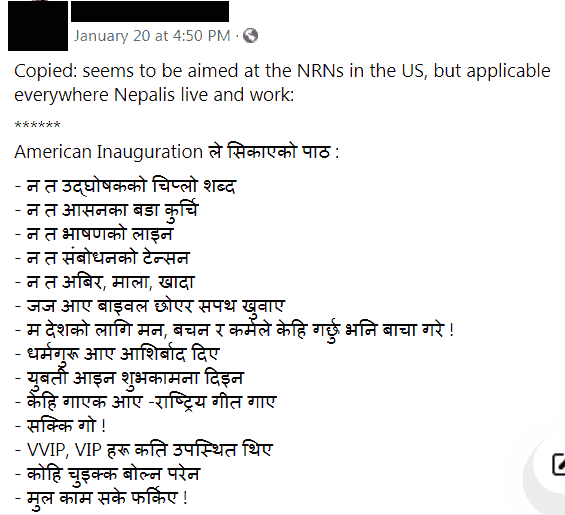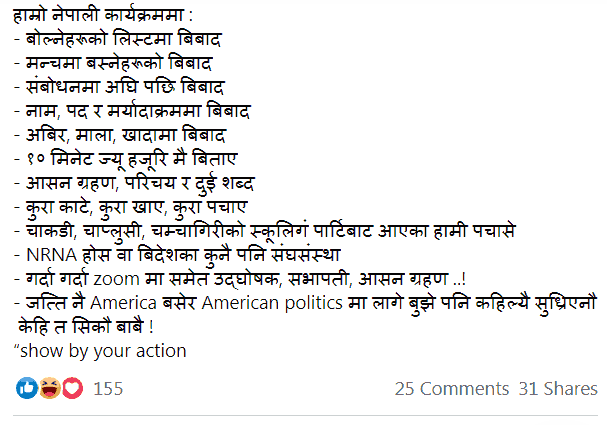When form and protocol generally take precedent over and is valued more than substance, a society struggles to make social, economic, and political progress.
Nepali society is one where that is the norm and for good reason too: we are a highly patriarchal and stratified Brahmanical society where Khas-Arya (hill so-called High Caste Hindu) men sit at the top of the pecking order. Many of the inane forms and protocols, therefore, reaffirm and reinforce that standing of theirs, among other things. In Nepal, we call that (and many such archaic traditional cultural practices) “Sanskiriti” or “Chalan.”
Sanskiriti, for example, calls for respect for — and the veneration of — old men, people automatically presumed to be wise and much more knowledgeable than others. As a matter of fact, systems and structures for the entire history of the country have been such that (old) men belonging to A group, the priestly caste — one of the two Khas-Aryas — have been able to decide pretty exclusively what knowledge is. Not surprisingly, they have been — and largely still are — accepted by many others as the ones having them AND in a position to impart.
Anyway, the following are two examples of old so-called High Caste Hindu men of academia who are offended by young women apparently not following forms and protocols and, in the process, display a complete disregard for — or ignorance of — the substance of the event: “Women in Science.” They also display an utter lack of respect for the women — women of similar academic and professional stature as them.
The incident took place on the last day of a week-long program organized by the Trieste-based International Center for Theoretical Physicists (ICTP), held at Tribhuvan University (TU), Kathmandu, the biggest public university in the country.
According to ICTP’s Facebook page, this was the whole program.
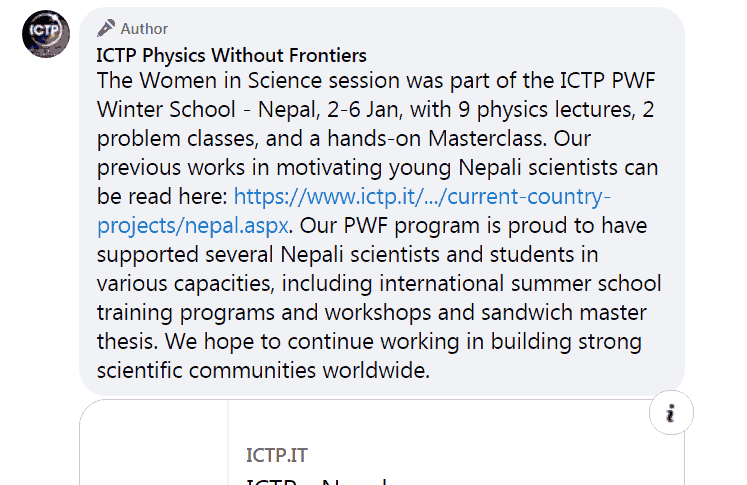
“Woman in Science,” a panel discussion, had been one of the events on the final day. A Facebook friend, Suyog Shrestha, one of the organizers, re-shared the post on his timeline (see image below).
Incidentally, I have not redacted any names because the post and all the discussions are public.
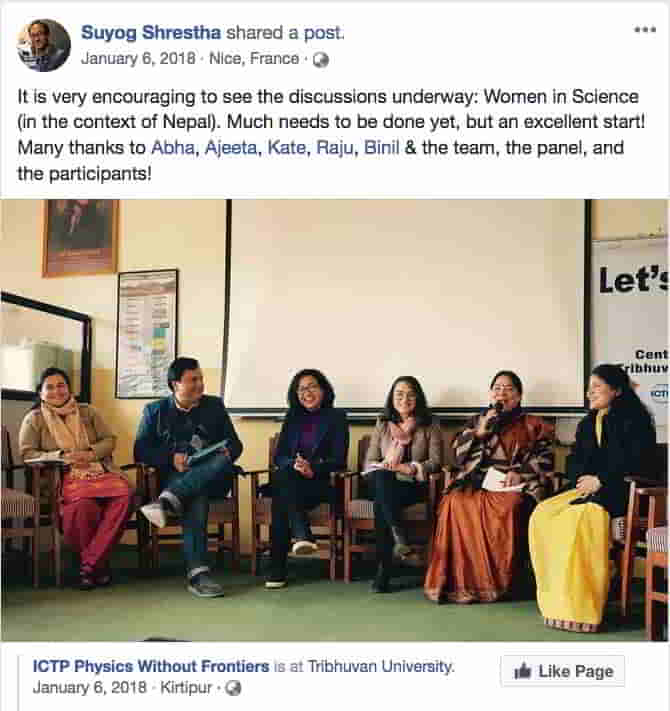
The image below reproduces the sentiments of the first old man of TU academia Binil Aryal (see image below), a Khas-Arya and the Head of Physics department at TU. (Please ignore the language issues.)
He expresses his displeasure at being “interrupted twice.” He hints at other panelists showing disrespect for a colleague (who “walked out from the hall”) and for pictures in the hall (“mentioned negatively twice!”). He defends the pictures arguing they were “never meant [to show] gender bias.”
To add weight to his complaints, he says that he is speaking, reluctantly, on behalf of “TU authorities, my colleague and a large number of students [who] wrote/reacted/phoned me suggesting not to provide ‘academic forum’ to social issue.”
Shrestha responds with some questions. Unfortunately, Aryal does NOT provide any responses to them, except to say, ironically, “I do not like to write everything in social media.”
Rakshya Khatiwada, a (female) Nepali Physicist responds very eloquently and in a very respectful tone to Aryal’s objections. She even volunteers to discuss the issues with him.
Sadly, pathetically, and not surprisingly, in response, Aryal provides just a terse comment sarcastically labeling Khatiwada’s comment as “long nice lecture/text.”
Being the privileged and entitled old Khas-Arya man that he is, of course he is pissed off that someone has the temerity to even appear to challenge him, especially a young woman!
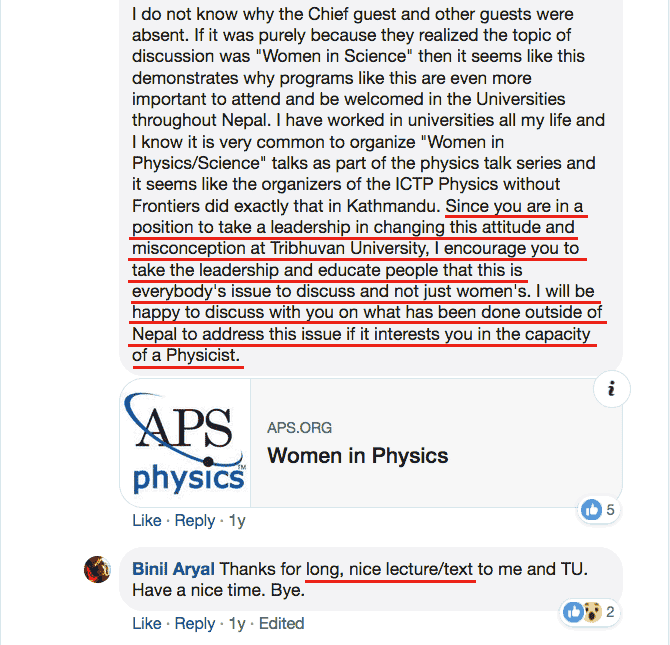
Another member of the organizing team Sean Khatiwada clarifies what the comments about the pictures in the hall had been really about ( “implicit bias” toward male scientists and NOT “disrespect” for them). He further clarifies how “hanging a picture of females scientist [alongside them]” would have helped.
As for Aryal’s complaint about being interrupted, an attendee Darshan Chalise points out “he was interrupted only when he was speaking in a topic that had nothing to do with the question of implicit bias.”
Roshan Joshi (below) also points out how Aryal, even during the discussion, had expressed the idea that the topic of “women in science […] should not have been discussed there.” Joshi also reiterates Chalise’s contention that Aryal “was saying the [sic] things that were out of the domain of the discussion”.
On to the next highly privileged, entitled, old man: Devendra Raj Upadhyay, also a Khas-Arya and a physics lecturer at one of the many TU campuses in Kathmandu valley. (Please ignore the language issues in his comments as well.)
No different from Aryal, he also appears to have felt “uneasy” and taken issue with, “You(Abha, Ajeeta, Kate)” all three females, for not having any “plan to motivate young Nepali Scientists” and for their lack of “respect to [sic] our leading Professors.”
That the three young women scientists being there in person, in front of the audience, to begin with, was, of course, to motivate and inspire the young. But Upadhyay, so high on his own ego and limited understanding of what constitutes “motivation” or inspiration, appears to have completely failed to see something as obvious that. And that is NOT the only thing he missed however!
In response, Shrestha comments asking for details.
Except Upadhyay (see image below), no different from Aryal, responds by speaking for “all participants.” He contends everyone “felt uneasy” about the subject and blows it off saying “We feel it is a program conducted by some NGO.”
Again, no different from Aryal, a fellow professor and old Khas-Ayra man, he also takes issue with the apparent disrespect shown by the panelists: “Regarding question about respect they are […] treating our senior and leading professors as a friend.” All that from an old man who admits to NOT being “present in [sic] entire week [the program ran for]”. You could be forgiven for thinking that Upadhyay and Aryal may have been the same individual.
What is kind of farcical is that he ends his diatribe with “Don’t mind please…”
One of the panelists, Ajeeta Khatiwada addresses, very eloquently, all the issues raised — and hinted at — by Upadhyay, including his objection with treating professors as friends.
She hits the nail on the head when she asks, “Why do you think we should have treated TU professors differently, because they are men and we (Kate, Abha, and I) are women?”
Of course, that is exactly the case here! These two old Khas-Arya men expected these young women to show undue respect to old Nepali men, like them, for being old and MEN.
It looks like Upadhyay, not having even been there the whole time and, pathetically, not having done any background work, didn’t even know that Saturday’s events had been just the last ones in the series of a week-long program. Shrestha, in responding to him, details that (see image below).
Unfortunately, Upadhyay — a Physics Lecturer and an old Khas-Arya man, let me remind you — instead of acknowledging his mistakes, ego bruised and offended that they had the gall to appear to even challenge him, goes on the offensive (see image below). Doing so in a way an immature teenager might, he ends up making a fool of himself. But I bet he’ll beg to differ.
He addresses Ajeeta with “NRN [Non-resident Nepali] Dr. Ajeeta” in an effort to disparage her and sarcastically remarks “you are great personalities […] maybe […] capable of Nobel Prize. We are proud of you.”
He proclaims, “We already faced much more social issues [sic] don’t open social issues in front of Science Academicians/researchers by the name of gender, caste, and religion in Nepal,” amplifying Aryal’s opinion.
This is NOT the first time I have comes across Nepali academics who are against discussing social issues at institutions of higher learning. And, if Aryal is to be believed, he is NOT alone at the University who are also against it.
He either deliberately misinterpreted (so as to be able to go on the offensive) or just plain misunderstood Ajeeta’s line about working at “ATLAS, CMS, LHC and institutions all around the world”! Based on everything he has written so far, my bet is on the latter.
Here are the responses from Shrestha and Ajeeta. The latter owned Upadhyaya, but he likely had no idea. Read the responses and see for yourself!
The admin for ICTP Physics Without Frontier’s Facebook Page also responds.
Another participant Vikram Upadhayay chimed in (see image below). Turns out, Aryal’s insinuation that his “colleague left the hall” because of lack of respect for him had been a complete lie. The colleague, Prof. Jha, had announced at the very beginning that “he’d be leaving early.” So, Aryal had just lied through his teeth to further his fragile-ego driven point!
What’s more, turns out, Aryal also “left the stage”! In other words, if anyone was disrespectful of others, it was Aryal himself. He disrespected the rest of the panelists, the audience, and the organizers of the program. He behaved like a petulant child!
However, I doubt he viewed his leaving as disrespectful to the other panel members — who had volunteered their time and energy to come all the way from the US to be part of it! As privileged and entitled as he comes across, I am pretty certain that Aryal felt ENTITLED to leave the stage when he did and for the reason that he did.
With old men like him in Nepal, everything MUST go their way — just the way they want and expect — and everything must revolve around them. Otherwise, being very insecure and thin skinned, they can’t stand it and behave like immature children — and that’s exactly how he appears to have behaved.
Vikram does agree, however, that one of the two times Aryal was interrupted was “unjustified.”
Furthermore, Vikram also theorizes why we in Nepal face issues such as these in even professional/academic settings.
If it’s NOT been clear already, all of that demonstrates how little respect the two professors actually have for women, men who obviously value respect…for people like themselves!
Of course, this is but just one example of how we in Nepal stress form and protocol, a lot of which, by the way, are aspects of what I call old Khas-Arya male culture.
Another area where this aspect of their culture operates — and are strictly adhered to — is at pretty much every official public function or event.
The most important guests at such functions are invariably all or mostly old men. Another characteristics of the VIPs is that they are mostly political leaders, bureaucrats, or members of the three branches of the government, a majority of whom are — you guessed it — old Khas-Arya men.
Such functions ALWAYS start late, mainly because the VIPs arrive late, which, as twisted as it sounds, they do as a show of their power and standing. Such functions rarely — if ever — start without the VIPs! An inordinate amount of time is wasted on speeches by the VIPs — speeches that drone on and on and on but consisting mostly of just pointless drivels of little to no significance, of little substance in other words. All of that happens for NO other reason than to stoke the egos of the VIPs, i.e. as an inherent and integral part of Sanskriti. Kissing ass of old men, sadly, is part of the culture of Nepali society.
(This happened even at the end of year/graduation functions of my little nephew’s pre-school — on a day that was supposed to be ALL about and for toddlers! The program included speeches by old men…with little toddlers running around all over the place — talking, screaming, shouting, just being carefree and spontaneous little children and having fun!)
In preparation for life in such a society, Nepali education and child-rearing practices deliberately avoid teaching children to question or challenge anything about our beliefs, our behaviors, our Sanskriti, our Chalan, our society etc.
As a matter of fact, children are taught — both in school and at home — to be unhealthily deferential to adults and the old through fear of violence, verbal, emotional, or even physical. And most do grow up with — and, as young adults, do have — high regard for them. That is NOT to insinuate that the elderly don’t deserve any respect. Of course NOT.
The argument goes that if we don’t follow our Sanskriti, social order will degrade and our society will ultimately crumble and collapse.
(If you are a very religious Hindu, you’ll also believe that then an Avatar (reincarnation) of Vishnu will come down to earth and restore order!)
The truth actually is that the default high standing of the old (Khas-Arya) men in — and their control of — the society will come tumbling down, not the society. What’s bad for old men in power in societies like Nepal is actually good for the society. Unconstrained by such men and their archaic and power-hungry ways, society will actually make social, economic, and political progress!
Hence the reactions of the Khas-arya professors and old Nepali men in general to any perceived threats against the hallowed social order. Hence the insistence on form and protocol in general and disregard for substance.
What do you think?
(If interested in another example of the arrogant behavior of an old Khas-Arya bureaucrat, blinded by privilege and sense of entitlement click here. If you interested in an example of form and protocol at a public event — a marathon in Kathmandu — involving ass-kissing click here. If interested in an example of women having to basically kow-tow to old Khas-Arya bureaucrat click here. If you are interested in an example of an everyday man showing utter disregard for and treating a woman colleague as if she was invisible even while seated right next to him, click here. If interested in how Khas-Arya men have a monopoly over the bureaucracy at the secretariat click here. If interested in how old Khas-Arya men are represented and control the most important structures in the country, click here. And finally, if ineterested in reading reading about how we in Nepal show very little respect for children and expect and often even demand respect from them with the threat of violence, click here.)
Jan 25, 2021 Update
Came across this on FB and couldn’t resist sharing it here. Shared by a friend, the following first part is about how the American inauguration was run very very well.
The following, second half of the post, is about how a public event by and for Nepalis including abroad such as in the US is full of form and protocol. What the post details are the element of the circus that is a Nepali public function.
To restate something I have said before, the reason all the above happens even among Nepalis living abroad is that you can take a Nepali out of Nepal but you can’t take Nepal out of him. Yes, almost always a him.


